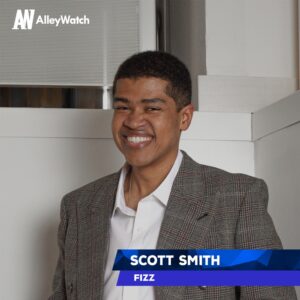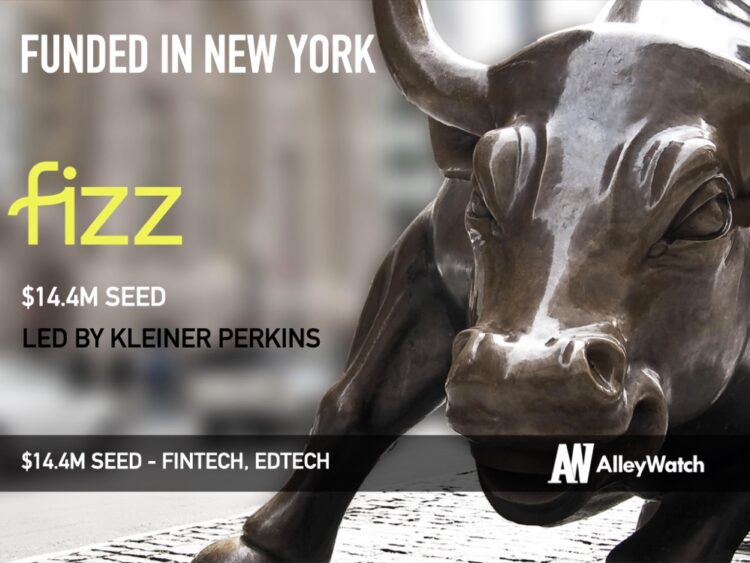58% of Gen Z shoppers show a preference for debit cards over credit cards, indicating a trend toward avoiding potential debt accumulation. However, typically, debit card usage does not contribute to credit building since such transactions are not reported to credit bureaus. Enter Fizz, a financial literacy platform coupled with a debit card, designed for college students. It requires no prior credit history, cosigners, or security deposits. The platform incorporates AI-powered budgeting tools that tailor spending limits and offers personalized recommendations, alongside gamified educational courses. Unique to Fizz, it reports to credit bureaus, enabling students to establish a credit history and also avoid traditional credit cards. Additionally, it features an extensive rewards program. Currently, Fizz is operational in over 300 colleges and is projected to surpass nine figures in annual card volume this year.
AlleyWatch caught up with Fizz COO and Cofounder Scott Smith to learn more about the business, the company’s strategic plans, recent round of funding, and much, much more…
Who were your investors and how much did you raise?
We raised a $14.4M seed round led by Kleiner Perkins, with participation from SV Angel, Y-Combinator, New Era Ventures, and the founders and operators behind many household name unicorns, like Postmates, Handshake, Public.com, and Airbnb.
Tell us about the product or service that Fizz offers.
Fizz makes a financial literacy and budgeting app for college students, and a debit card that builds credit. With Fizz, students get a holistic home for all things financial adulting, from building credit history and monitoring their score, to AI savings recommendations, a budgeting toolkit, and game-like financial literacy courses.
What inspired the start of Fizz?
 Carlo (cofounder) and I faced the difficulties of financial adulting, lack of financial literacy, and building credit history head on. As a freshman at Harvard, Carlo couldn’t get approved for a credit card, and couldn’t start building credit history. A few states away at Cornell, I saw that even my smartest friends weren’t well informed about their finances, and didn’t have good money habits. We both dropped out to create Fizz and develop the products that we and our friends desperately needed in school.
Carlo (cofounder) and I faced the difficulties of financial adulting, lack of financial literacy, and building credit history head on. As a freshman at Harvard, Carlo couldn’t get approved for a credit card, and couldn’t start building credit history. A few states away at Cornell, I saw that even my smartest friends weren’t well informed about their finances, and didn’t have good money habits. We both dropped out to create Fizz and develop the products that we and our friends desperately needed in school.
How is Fizz different?
What sets Fizz apart is that we create financial products exclusively for college students and young adults. This group is overlooked because they often don’t yet have credit scores, or steady income streams, but that doesn’t mean they don’t need solutions that can provide consumer and business value. By focusing solely on 18-24 year olds, we can build tailored solutions that address their unique needs, unlocking significant untapped potential, and driving immense value for users.
What market does Fizz target and how big is it?
Fizz targets college students (>20M of them in the US, with 5M freshmen entering each fall), and young adults. Fizz is targeting the most valuable and high LTV segment in consumer finance and retail banking.
What’s your business model?
Fizz makes money primarily from subscriptions, interchange fees, and affiliate partnerships.
How are you preparing for a potential economic slowdown?
Fizz built and owns nearly all of its own ironclad software infrastructure, driving significant cost synergies and allowing it to expand across the vertical faster.
What was the funding process like?
Fizz ran a conventional fundraising process bi-coastally, courting investors in New York, and in Silicon Valley. We took 95% of Fizz’s fundraising meetings in person.
What are the biggest challenges that you faced while raising capital?
Demonstrating that there is still immense and durable value in consumer and in fintech, independent of market cyclicality.
What factors about your business led your investors to write the check?
Unique penetration into a very valuable segment with one of the fastest financial products and platforms to gain adoption among college students since Venmo.
What are the milestones you plan to achieve in the next six months?
Bring Fizz to even more colleges and universities, and become the go-to financial resource for the incoming class of 2028.
What advice can you offer companies in New York that do not have a fresh injection of capital in the bank?
Staying lean and talking to your users is not necessarily as trite as it might seem. Fizz built its infrastructure with an incredibly small team, and with less money than the next closest competitor. Talking to users obsessively can help you determine where the business can drive near-term cash flows in sometimes highly surprising or unexpected ways. This goes for both B2B and consumer.
Staying lean and talking to your users is not necessarily as trite as it might seem. Fizz built its infrastructure with an incredibly small team, and with less money than the next closest competitor. Talking to users obsessively can help you determine where the business can drive near-term cash flows in sometimes highly surprising or unexpected ways. This goes for both B2B and consumer.
Where do you see the company going now over the near-term?
Fizz has a very ambitious product roadmap and is currently sprinting to launch two more products before the 2024 fall back-to-school season.
What’s your favorite summer destination in and around the city?
Prospect Park is great for summer weekends, and there’s nothing better than a summer workday in Soho, where nearly 90% of Fizz’s team works in person.





